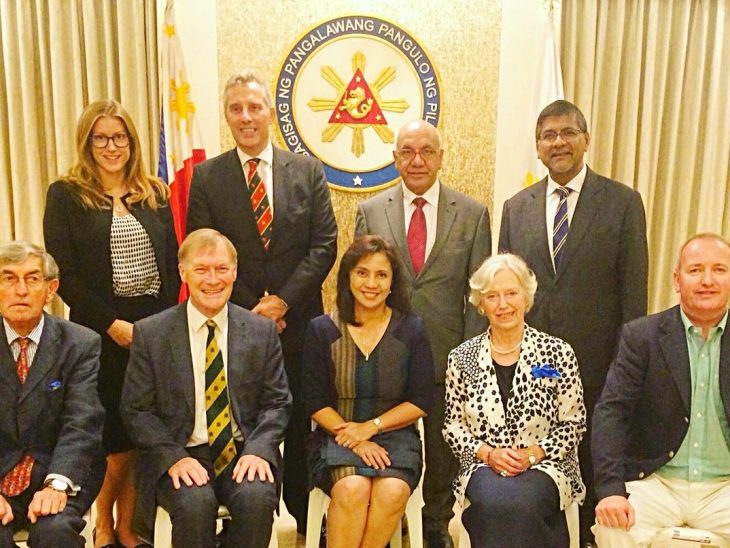

Timely visit to Philippines highlights bilateral links
From 17-24 September 2016, I led a cross-party delegation to the Philippines. The delegation consisted of Baroness Hooper (Conservative), Mark Pritchard (Conservative), Virendra Sharma (Labour), Ian Paisley (DUP), Lord Rogan (UUP) and myself. We were accompanied by Emily Davies from the BGIPU who guided us ably through a full programme.
Some of our group had visited the Philippines before and some were visiting for the first time. However, all of the members looked forward to engaging with the new government and finding out more about the priorities and plans of the new administration under President Duterte. The main areas of interest included the relationship between the Philippines and the UK following Brexit, trade opportunities, human rights and the proliferation of drugs in the Philippines.
Our programme began on Monday 19th September with a wreath laying ceremony at the Rizal Monument, followed by a meeting with Trade and Industry Secretary Ramon Lopez. The issue of future bilateral treaties was discussed. There is already a healthy import/export market with the UK and companies such as M&S, Jaguar and Debenhams already have a presence in the Philippines. The issue of political stability was raised by our group but the Minister was confident that the President would not suspend the constitution and cooperation with the UK in areas such as education would continue to be explored.
There followed a courtesy call on Senate President Aquilino ‘Koko’ Pimentel III and other senators where the long relationship with the UK was discussed. The Senators confirmed that President Duterte had a 92% approval rating in the Philippines which was rather impressive and would have been the envy of any British politician!
The final meeting on Monday was with the British Council, who have been established in the Philippines since 1980. Their main focus has been in education but they are also supporting the peace process in Mindanao. They have also launched a social enterprise programme in Mindanao focusing on SMEs and job creation. The delegation raised the issue of drug dependency which the British Council is not currently addressing and suggested closer links between Filipino and UK universities.
Tuesday 20th September began with a visit to the Department of Foreign Affairs. Discussions regarding the situation in Mindanao and the Philippines relationship with the USA and China took place. The Under-Secretary of the Department stated that the President would have greater power and resources to sustain peace in Mindanao and the delegation expressed concerns regarding proposed constitutional reforms.
The Philippine government is keen to attract more investment from the UK post-Brexit and hopes to increase trade through SMEs. Migration policy was discussed, particularly the impact this might have on the nursing and caring professions. The Philippines hopes to maintain its position on the migration priority list. Baroness Hooper floated the idea of the Philippines joining the Commonwealth.
A timely meeting with the Philippine Nurses Association followed where I spoke about my experience with VSO and the Association. Filipino nurses are a great asset to the NHS and our discussion included how to keep track of the numbers of nurses in the UK. The pay and conditions of nurses in the Philippines was also discussed.
The afternoon continued with a meeting at the Department of National Defence where the changing threats to global safety and security were discussed. Terrorism, Chinese expansion in the region and aviation security were all touched on and the role of US soldiers in peacekeeping was spoken about.
The delegation then went to the House of Representatives (HREP) to pay a courtesy call on the Speaker and to see the HREP in session where the delegation was officially recognised. The meeting with the Speaker included a discussion about the hearing currently ongoing in the HREP regarding legislation on the proliferation of drugs in the Philippines. Issues such as immunity for prisoners and human rights were raised, as was the prospect of constitutional reform and oversight of the executive. The delegation were informed that the Philippines did not have an equivalent of Prime Minister’s Question Time and Ministers did not face oral questions either. The day closed with a private dinner meeting with HE Asif Ahmad, the UK Ambassador to the Philippines.
On Wednesday 21st the delegation prepared to depart Manila for Iloilo. En route, they met with the Labour and Employment Secretary and paid a courtesy call on the Vice President, Maria Leonor Robreda. Discussions centred on the pay and conditions of Filipino nurses in the UK as the Philippine government is concerned for the job security of its nurses post-Brexit. The Minister was assured that the UK would be looking to employ more foreign workers from outside the EU once the UK left the European Union.
The meeting with the Vice President revealed that she was using her office to concentrate on advocacy on behalf of women and to improve healthcare and education. She gave an interesting overview of politics in the Philippines, stressing that personalities rather than policies tend to drive the government agenda. Corruption in government and the war on drugs were also discussed.
The final days of the delegation were spent in Iloilo and included visits to cultural centres, local businesses and an ecotourism tour. A meeting was held with the International Care Ministry Charity which helps 240 communities in the Iloilo area which it judges to be ‘ultra poor’. They use a business approach to transforming poverty and supply people with the tools to start their own businesses. Around 16% of their funding comes from UK-based voluntary organisations.
Our visit ended with a trip to Smokey Mountain at the suggestion of Mark Pritchard MP. This had a profound effect on our delegation. We visited a school primarily supported by British philanthropy where we were given a wonderful reception and we later visited the children’s homes. The living conditions were far removed from what would even be regarded as unacceptable housing in the UK. It proved to us all how well directed aid, at least in terms of the school, could transform people’s lives. So my wonderful group of colleagues, so ably supported by Emily, left the Philippines with mixed emotions but determined to develop and foster closer ties between our countries.













